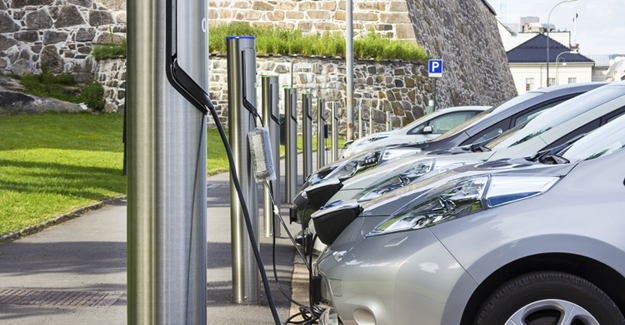Charging volume doubles in a year
Electric vehicle charging points in Scotland were used 26,119 times during August 2016.
This is twice the volume (12,939) in the same month a year earlier, and nine times the usage in August 2014 (2,885).
Despite the overall increase in usage there were still 25% of charge points that were not used at all during August 2016, though this was down from the 32% not used at all in August 2015 and 45% that went unused in August 2014.
(A full table of charge points and their usage listed by local authority follows below.)
At the end of June 2016 – the latest figures available – there were 3,575 electric cars and vans licensed in Scotland eligible for the government’s plug-in car and van grant schemes. This is compared to 2,050 at the end of June 2015.
The figures are revealed as part of RAC Foundation analysis of data collected from the ChargePlace Scotland network.
The bulk of the charge points in the ChargePlace Scotland network are publicly accessible though some are located on private commercial premises and will have limited public availability.
The analysis does not include domestic charge points also funded by ChargePlace Scotland.
As of August 2016 there were 870 public and commercial charge points in the ChargePlace Scotland network with a total of 1,772 connectors (sockets) between them.
This compares with 694 charge points and 1,373 sockets a year earlier.
Rapid chargers made up 18% of the total number of chargers but were used for 42% of all charging sessions.
According to ChargePlace Scotland the “majority of public charge points will fully charge most EVs in 4-8 hours. Rapid chargers can charge most EVs from 0 to 80% in 20-30 minutes.”
Steve Gooding, director of the RAC Foundation, said:
“They say that when it comes to buying a house location, location, location is everything. So it goes with electric charge points. Facilities need to be in places where people will use them. But there’s something more.
“The evidence suggests that it is rapid chargers that are getting a disproportionate amount of use, which bears out the view that improving the convenience and speed of ‘filling’ up with electricity is mission critical to the wider take-up of these vehicles.”
Table: charge point usage by Local Authority, August 2016
|
Aug 2016 |
Charge points |
Connectors |
Charge points used at least once |
% of charge points used at least once |
|
Aberdeen City |
44 |
82 |
37 |
84% |
|
Aberdeenshire |
18 |
45 |
13 |
72% |
|
Angus |
16 |
28 |
12 |
75% |
|
Argyll & Bute |
22 |
54 |
11 |
50% |
|
Clackmannanshire |
12 |
25 |
10 |
83% |
|
Dumfries & Galloway |
20 |
44 |
8 |
40% |
|
Dundee City |
70 |
149 |
58 |
83% |
|
East Ayrshire |
11 |
24 |
6 |
55% |
|
East Dunbartonshire |
4 |
9 |
3 |
75% |
|
East Lothian |
19 |
35 |
11 |
58% |
|
East Renfrewshire |
5 |
11 |
5 |
100% |
|
Edinburgh, City of |
68 |
128 |
46 |
68% |
|
Eilean Siar |
17 |
37 |
9 |
53% |
|
Falkirk |
15 |
30 |
12 |
80% |
|
Fife |
69 |
138 |
58 |
84% |
|
Glasgow City |
76 |
156 |
68 |
89% |
|
Highland |
45 |
108 |
32 |
71% |
|
Inverclyde |
8 |
18 |
8 |
100% |
|
Midlothian |
27 |
47 |
19 |
70% |
|
Moray |
15 |
33 |
10 |
67% |
|
North Ayrshire |
13 |
28 |
11 |
85% |
|
North Lanarkshire |
16 |
30 |
12 |
75% |
|
Orkney Islands |
19 |
43 |
16 |
84% |
|
Perth & Kinross |
35 |
78 |
28 |
80% |
|
Renfrewshire |
28 |
59 |
21 |
75% |
|
Scottish Borders |
34 |
61 |
20 |
59% |
|
Shetland Islands |
11 |
24 |
7 |
64% |
|
South Ayrshire |
17 |
33 |
12 |
71% |
|
South Lanarkshire |
64 |
108 |
46 |
72% |
|
Stirling |
25 |
53 |
22 |
88% |
|
West Dunbartonshire |
14 |
29 |
10 |
71% |
|
West Lothian |
11 |
23 |
8 |
73% |
|
Location unknown |
2 |
2 |
2 |
100% |
|
Total |
870 |
1,772 |
651 |
75% |
Contact:
Philip Gomm – Head of External Communications – RAC Foundation
[email protected] | 020 7747 3445 | 07711 776448 | 020 7389 0601 (ISDN)
Notes to editors:
The RAC Foundation is a transport policy and research organisation that explores the economic, mobility, safety and environmental issues relating to roads and their users.
The Foundation publishes independent and authoritative research with which it promotes informed debate and advocates policy in the interest of the responsible motorist. All the Foundation’s work is available at: www.racfoundation.org



